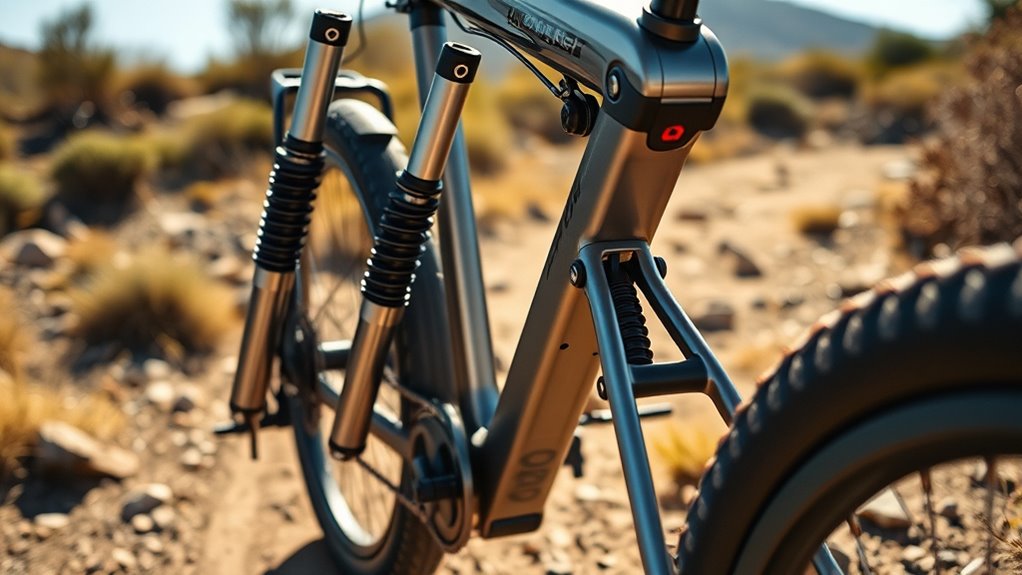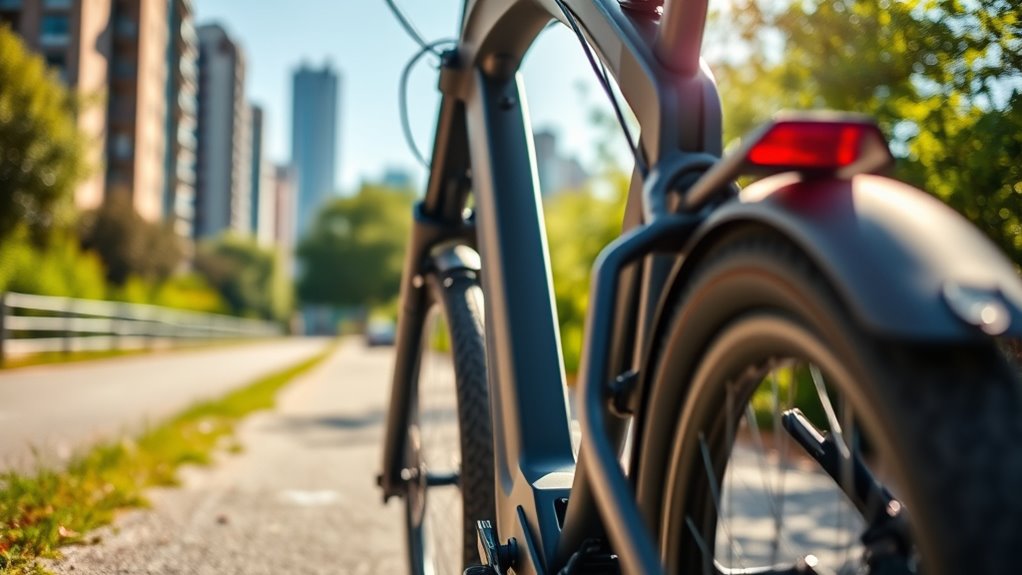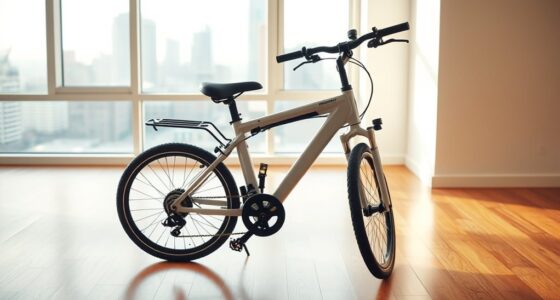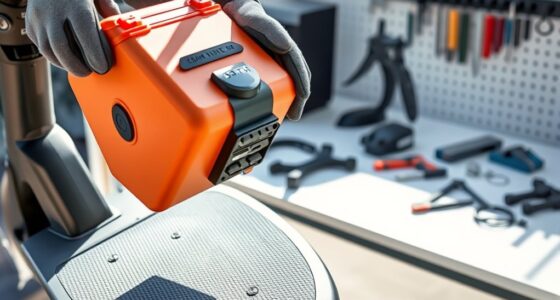Whether you need suspension on a folding e-bike depends on where you ride. If you mostly stick to smooth city streets, suspension might be unnecessary and could add weight, reduce portability, and drain your battery faster. However, if you often ride over rough terrain or uneven paths, suspension can boost comfort, control, and safety. Want to discover how different types of suspension impact your ride and what suits your needs best? Keep exploring to find out more.
Key Takeaways
- Suspension enhances comfort and control on rough terrains but can increase weight and reduce battery efficiency.
- Folding bikes with minimal or no suspension are more portable and easier to store.
- For city riding on smooth surfaces, suspension is unnecessary and may add unwanted bulk.
- Proper maintenance of suspension systems is essential for safety and optimal performance.
- The choice depends on your typical riding terrain: rough or urban, influencing whether suspension is beneficial.

When choosing a folding e-bike, considering its suspension system is essential for a smooth ride. Suspension impacts how comfortably you can navigate various terrains, but it also influences other important factors like battery life and the folding mechanism. If you’re planning to ride mostly on city streets and smooth paths, you might not need a complex suspension system. However, if your routes include rougher terrain or uneven pavement, suspension can make a significant difference in comfort and control.
Choose a suspension system based on terrain for a smoother, more comfortable ride.
A key aspect to contemplate is how suspension affects battery life. Bikes with advanced suspension systems tend to consume more energy because they require additional components like shocks, forks, or rear suspension arms. This extra load can drain the battery faster, reducing your overall range between charges. If you’re commuting daily and need maximum battery efficiency, opting for a lightweight, minimal suspension setup—or none at all—might be smarter. Conversely, if comfort outweighs range concerns and you’re willing to recharge more frequently, a bike with full suspension could be worthwhile.
The folding mechanism also plays a role when choosing a suspension system. Some bikes with sophisticated suspension have bulkier designs, making folding and portability less convenient. Many high-quality folding e-bikes integrate suspension into a compact frame, but the more complex the suspension, the more carefully you need to evaluate how easily the bike folds. If portability and quick storage are priorities, you may prefer a bike with a simple or no suspension to keep the folding mechanism straightforward and efficient.
On the other hand, suspension can greatly enhance your riding experience by absorbing shocks from potholes, curbs, and uneven surfaces. If you frequently ride over rough terrain or have to deal with urban obstacles, the added comfort and control can make your trip safer and less tiring. You’ll find that suspension helps maintain better contact between the tires and the ground, giving you more confidence and reducing fatigue over long rides. Additionally, proper maintenance of suspension components is vital to ensure ongoing performance and safety.
Frequently Asked Questions
Can Suspension Bikes Handle Rough Terrains Better Than Non-Suspension Bikes?
Yes, suspension bikes handle rough terrains better than non-suspension bikes, especially on mountain trails where uneven surfaces and bumps are common. Suspension absorbs shocks, providing a smoother ride and better control. On urban streets, however, lack of suspension can make rides less comfortable on potholes and cracks. So, if you frequently ride off-road or uneven terrain, suspension is a smart choice for comfort and stability.
How Does Suspension Affect the Overall Weight of a Folding E-Bike?
Think of suspension as the backbone of your bike’s comfort. It does add some weight increase, making your folding e-bike slightly heavier, which can impact portability. The design impact is noticeable, as suspension components require space and sturdy framing. While it offers smoother rides, keep in mind that extra weight might influence how easy it is to carry or store your bike. Weigh the benefits against the added weight for your riding needs.
Is Maintenance More Complicated With Suspension Systems on Folding E-Bikes?
Maintenance complexity increases with suspension systems on folding e-bikes because they have more moving parts that need regular care. You’ll need to check suspension durability regularly, lubricate components, and sometimes replace worn parts. This added upkeep requires more attention compared to bikes without suspension. However, if you value comfort and smoother rides, the extra maintenance is worth it. Just stay consistent with checks to guarantee ideal performance and longevity of your suspension system.
Do Suspension Systems Significantly Increase the Cost of Folding E-Bikes?
Adding suspension to a folding e-bike does cause a cost increase, mainly due to the added component complexity. You’ll notice higher prices because suspension parts are more expensive and require precise installation. While it offers a smoother ride, consider whether the comfort justifies the extra cost. If you mainly ride on smooth surfaces, the suspension’s added expense might not be worth it, but for rough terrain, it’s a valuable upgrade.
Are There Specific Types of Suspension Better Suited for City Commuting?
When choosing suspension options for city commuting, you want urban comfort without adding unnecessary weight. Soft fork suspensions or seat post suspensions are ideal, as they absorb bumps and potholes, making rides smoother. These options are lightweight and effective, enhancing comfort without compromising portability. If you prioritize convenience and comfort in urban environments, opt for suspension systems designed specifically for city streets to get the best balance of comfort and practicality.
Conclusion
Whether you choose to add suspension or not, it’s like choosing the right shoes for your journey—you want comfort without extra weight. Suspension can smooth out the bumps and make rides more enjoyable, especially on rough roads. But if you prefer a lighter, more agile feel, you might skip it. Think of it as tuning your bike to match your adventure—sometimes a gentle cushion is perfect, other times, a sleek ride gets you there faster.









